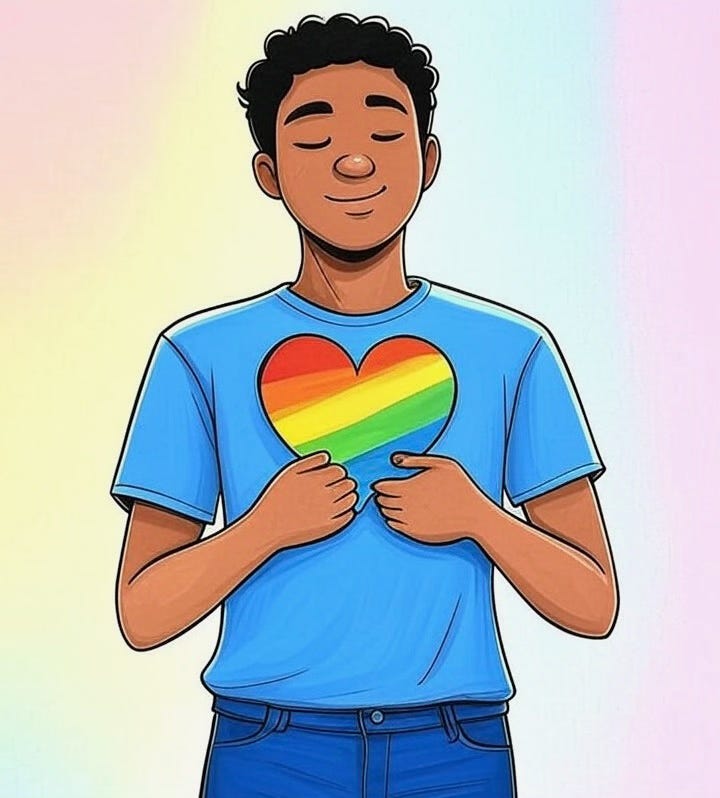Self-acceptance Is Better Than Pride
It starts with LGBT-You
Pride Month is here.
The LGBT+ community will come together to celebrate. Outsiders are welcome to join. Given its festive nature, it is hard to see the downsides.
Pride makes people happy.
There are also skeptics.
Conservative thinker Jordan B. Peterson does not like Pride. He argues that pride is a sin, and any celebration based thereupon is sinful. If that is true, the festivities would be misguided - why celebrate bad character?
But is pride always a sin?
Surely, there are achievements human beings should be proud of. Broadly speaking, building a reliable character, serving others, or raising good children arouse a healthy sense of pride in us. It is hard to argue that such pride is unjustifiable.
Thus, while sometimes toxic, pride has a purpose.
Because of discrimination, LGBT+ individuals may face more adversity than others. If it is harder for them to thrive, their successes are all the more impressive. If they help others succeed, they have even more to be proud of.
Individuals who beat the odds (despite dire circumstances) should be proud.
Pride Month, however, celebrates identity more than achievement.
It celebrates gays (for example) for who they are, not what they do. There is nothing wrong with being gay, but one might ask why it is worthy of praise. Sexuality is something you are born with, not something you have achieved.
For good reason, we do not celebrate skin colour, so why celebrate sexuality?
Norm Macdonald, a comedian, once said:
“That’s an odd thing to be proud of! […] It’s not an achievement. […] My kid… We’re proud of him, Johnny! He graduated from Harvard first in his class! And […] he loves c*ck!”
Gays should be accepted for their nature, but it is dubious whether they should be celebrated for it.
Homosexuals are not all the same. Like any group, they consist of awesome and awful people. If you celebrate all of them, you are bound to miss the mark.
Elton John is admirable; Jeffrey Dahmer less so.
Pride often comes from shame.
For long, society shamed gays for who they are. It told them they were wrong for their nature. They responded: “Not only are we not ashamed, we are proud!” That reaction is understandable.
But it also enflames the hostility. By defying its norms, the Pride movement opposed the society they made part of.
They risked alienating the public.
Pride demands respect, but if unearned, it may lead to hubris.
Hence the Christian opposition to it. If you are proud of being white, you are proud of something you did not achieve, but were born with. The same is true for being gay.
By inflating the ego, unearned pride brings a person out of balance.
A proud person believes (correctly or not) that he is impressive. Hence, he expects respect (or even admiration) from his peers. But real respect is earned, never enforced.
Therefore, others may disagree, which causes conflict. The result is social instability.
Pride month is historically reactive.
During the Stonewall Riots (1969), homosexuality was still criminalized. Homosexuals were shamed out of society. The first Pride events (1970) marked their “coming out”: their entry into the public sphere.
Gays were no longer ashamed; they were proud and demanded respect.
There is a heroic element to it.
Overcoming oppression is an achievement. It takes courage to thrive despite it. In itself, that deserves pride.
The gay activists of the 1970s channeled their anger to defy societal stigma. They set themselves free.
They were angrily proud.
But anger and pride mix to produce an unstable condition. They make people self-righteous: ready to fight. After Stonewall, the celebration of gay identity was justifiable, but it also created strife.
It was necessary, but dangerous.
Unchecked pride always escalates into conflict because an infinitely proud person does not tolerate dissent. Thus, although gay acceptance has come a long way, strife with society remains. Instead of fostering harmony, pride is doomed to fuel conflict.
In the long term, it is counterproductive.
Acceptance is the true antidote to shame.
Being gay is natural and should be as accepted as having freckles. It is not something to be ashamed of, and not something to be proud of. If gays accept that, society will too.
The answer lies in the middle.
Defiance divides; acceptance unites.
Society should recognize the dignity of gays. But it is also up to them to forgive society for the oppression of the past. Only then can the two harmoniously coexist.
Mutual acceptance is the road to peace.
When gays are accepted, they will thrive. Thriving individuals are a benefit to the community. Hence, they will be well-liked.
More and more gays would be appreciated, admired, and embraced.
Of course, there would still be bigots.
But they would become an irrelevant minority. Ignoring bullies deprives them of their oxygen: attention. Protesting them typically fuels the flames.
When hate is shut out, love can prosper.
Is pride a sin?
Not necessarily. It has uses. It may help you escape millennia of social oppression.
But acceptance is better.
Pride is unstable, while acceptance provides inner and social peace.
If you are proud of your nature, you are proud of something you did not earn. But if you accept your nature and thrive, you get to be proud of your earned bliss. This difference is vital.
A great gay man should be proud, but of his greatness. His gayness is just a fact he should come to terms with.
In doing so, he will accept himself, and through his greatness, society will do the same.
The gays were wronged, and their grievances are justified.
But two wrongs do not make a right. Pride - since it leads to anger and hostility - arouses conflict, perpetuating the cycle of hate. Acceptance, instead, brings peace, allowing for love to flourish.
That, in turn, provides an achievement worthy of pride, which we may celebrate in June (or any other month).



